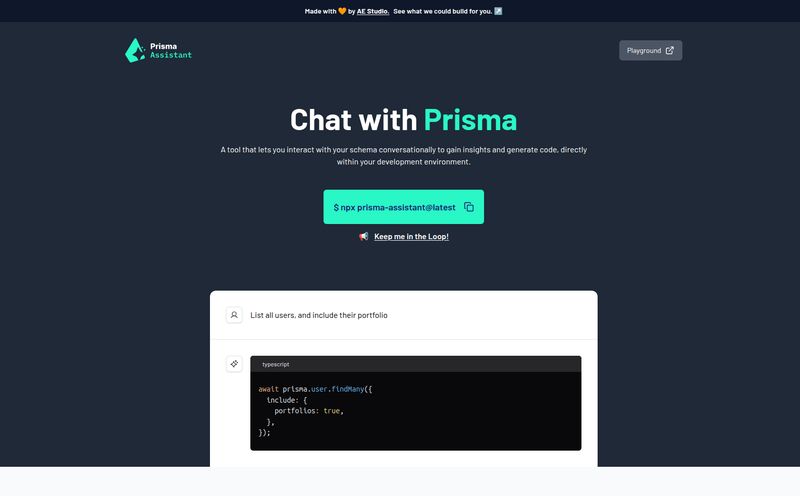We’ve all been there. Staring at that blinking cursor in the terminal. You know what you want to do. You need to find all the log files larger than 10MB from last Tuesday, compress them, and move them to an archive folder. Easy, right? Except the exact flags for find, tar, and mv have decided to take a little vacation from your brain. So begins the ritual: open a new browser tab, search Stack Overflow, piece together a command, and pray you didn’t miss a crucial forward slash.
It’s a tiny interruption, but these tiny interruptions add up. They break our focus, they drain our mental energy. For years, the command line has been this incredibly powerful, yet stubbornly archaic, part of our workflow. Well, I recently stumbled upon a tool called AiTerm that claims to want to change all that. Its promise? To let you talk to your terminal in plain English. Naturally, my inner geek was intrigued, but my inner cynic was on high alert. Another AI gimmick? Or something genuinely useful? I decided to take it for a spin.
So, What is AiTerm, Really?
Let's get the marketing speak out of the way. AiTerm is an AI-powered terminal assistant. But what that actually means is that it's a clever layer on top of your existing terminal (it works with iTerm, the VS Code terminal, PowerShell, etc.) that acts like a translator. It turns your human-language requests into the cryptic incantations that the shell actually understands. Think of it less like a cheat sheet and more like having a senior developer quietly whispering the right command in your ear, just when you need it.
You’re not replacing your terminal; you're augmenting it. You type what you want to do, and AiTerm suggests the exact command to get it done. No more context switching. No more broken focus. At least, that's the dream.

Visit AiTerm
The Features That Actually Matter
A tool can have a hundred features, but usually only a few make a real difference in your day-to-day. After playing around with AiTerm, a few things really stood out to me as being more than just novelties.
Speaking Your Terminal's Language
This is the main event. The ability to type something like “find all files with a .tsx extension and count the lines in each” and have it spit back find . -name ".tsx" -exec wc -l {} + is… well, it’s pretty magical. I’ve spent years building up muscle memory for commands like this, but there are always edge cases or tools I use less frequently (looking at you, awk and sed) where this is an absolute lifesaver. It’s like having Google and a man page built directly into your command prompt, but faster.
Autocomplete on Steroids
We're all used to basic tab-completion for file names or command history. AiTerm takes this a step further with what it calls "IDE-style autocompletion." It’s more context-aware. As you type, it doesn't just look at your history; it seems to anticipate what you might want to do next, offering intelligent suggestions for flags and arguments. It’s a subtle thing, but it makes the whole experience feel smoother and more modern, kind of like how IntelliSense changed the game in code editors.
Finally, An Organized Workflow
Every developer has that one `git` command. You know the one. It’s a beautifully complex one-liner you crafted to show a formatted log between two branches, and you use it once a month. You probably have it saved in a note-taking app somewhere. AiTerm includes a workflow feature to formalize this. You can save and organize these complex or frequently used command sequences. It’s basically creating your own personal, super-powered alias library, which is a fantastic way to boost productivity on repetitive tasks.
My Honest Take: The Good, The Bad, and The AI
Alright, so it sounds great on paper. But how does it feel in practice? I spent a week forcing myself to use it for everything I could. Here’s the unfiltered breakdown.
The privacy-first approach is a massive win in my book. The website is clear that it doesn’t store your terminal contents on its servers. This was my first and biggest concern. The last thing I want is my session history, complete with API keys or sensitive file paths, being uploaded to some third-party cloud. Knowing it all happens locally makes me much more comfortable integrating it into my real work. The setup was also painless across both my Mac (with iTerm2) and my Windows machine (inside VS Code's terminal).
However, it's not perfect. The AI, while impressive, can be a little too literal sometimes. You definately need to have enough command-line knowledge to sanity-check what it’s suggesting. Blindly running an AI-generated command is a recipe for disaster. Think of it as a brilliant but sometimes naive junior dev. You should always review their pull request before merging. It's not an autopilot; it's a co-pilot. This isn’t a flaw of AiTerm, per se, but a reality of the current state of AI. Don't throw away your fundamentals just yet.
Who Is AiTerm For? (And Who Should Maybe Skip It?)
I’ve been thinking about who gets the most out of a tool like this. It’s not for everyone.
In my opinion, AiTerm is a godsend for mid-level developers, DevOps engineers, and sysadmins. People who are comfortable on the command line but don't have every single command and flag for every single CLI tool memorized. If you're constantly working with Docker, Kubernetes, AWS CLI, or Git, this can genuinely speed you up. It’s also fantastic for learning a new tool, as it helps bridge the gap between knowing what you want to do and knowing how to write it.
Who should pass? Maybe absolute beginners. I still believe there's value in the struggle of learning the basics—`ls`, `cd`, `grep`—the hard way. Using a tool like this too early might become a crutch. And at the other end of the spectrum, the grizzled command-line veterans who have spent 20 years perfecting their `.zshrc` file with custom aliases might find it gets in their way. But for the vast majority of us in the middle? It hits a real sweet spot.
The Big Question: What About Pricing?
Here's the million-dollar question. As I'm writing this, the pricing information for AiTerm is a bit of a black box. The navigation bar on their site has a “Pricing” link, but there’s no concrete info. This usually suggests one of two things: it’s either in a free public beta (a great time to jump in and try it without commitment) or they’re still figuring out the model. I'm personally hoping for a one-time purchase fee rather than yet another monthly subscription to add to the pile. For now, it seems to be free to try, so my advice is to get in while the getting is good.
A Quick Look at the Neighborhood
AiTerm isn't the only player in this game. Tools like Fig.io have been doing amazing things with terminal autocompletion for a while, and GitHub's Copilot is also expanding into the command line. Where AiTerm seems to be carving its niche is in the direct, conversational "natural language to command" translation. While others are enhancing the autocomplete experience, AiTerm feels more like you're having a conversation. It's a slightly different philosophy, and which one you prefer will likely come down to personal taste.
Frequently Asked Questions about AiTerm
Is AiTerm safe to use with sensitive information?
Based on their public statements, yes. AiTerm processes data locally on your machine and does not send your terminal commands or output to their servers. This is a critical feature for maintaining security and privacy.
Does AiTerm work on Windows and Linux?
Yes. It supports a variety of popular terminals, including cmd and PowerShell on Windows, as well as iTerm and the default terminal on macOS and various Linux distributions.
Do I need to be a command-line expert to use AiTerm?
Not at all! It's actually great for users who are moderately comfortable but don't know every command. However, having a basic understanding of how the shell works is important so you can verify the commands it suggests.
Can AiTerm completely replace searching for commands online?
For a lot of common and moderately complex tasks, I'd say yes. It dramatically reduces the need to open a browser. For highly specific, niche, or troubleshooting-related issues, you'll likely still be heading to your favorite forums and documentation.
How is this different from my shell's built-in history (Ctrl+R)?
Your shell history is reactive; it only knows what you've typed before. AiTerm is proactive; it interprets your intent from natural language and generates new commands, even if you've never run them before.
Is AiTerm free?
Currently, the pricing is not publicly listed, which often means it's available for free during a beta period. It's best to check the official aiterm.net website for the most current information.
Final Thoughts: Is AiTerm a Keeper?
After a week of use, I'm moving AiTerm from my "interesting toys" folder to my "active toolkit." It's not going to write my code for me, and it's not a magic wand. But it successfully sands down some of the roughest edges of the command-line experience. It keeps me in the flow, saves me from dozens of micro-interruptions throughout the day, and genuinely makes working in the terminal feel a little less like a chore and a little more like a conversation.
If you spend any significant amount of time staring at a blinking cursor, you owe it to yourself to give AiTerm a try. It just might be the AI assistant your terminal has been waiting for.



